
GETTING to the Premier League Promised Land would breathe new life into Rangers and Celtic.
But it would leave the rest of Scottish football facing a slow, lingering death.
That’s why I can’t understand the “good riddance” attitude of non-Old Firm fans every time the English debate rears its head.
This time around, the scale of new reconstruction plans on the table in England mean the door is as wide open as it has ever been.
With eight new clubs required to make up the planned four divisions of 20 below the Premier League, Football League chief executive Shaun Harvey has not ruled out welcoming the Old Firm.
And you can bet the top dogs at both Glasgow clubs will be slavering at the prospect.
Why wouldn’t they be? Even if they start at the very bottom, they will have a clear
pathway to the riches of the Premier League.
That is a clear route to £100-odd million they otherwise wouldn’t be getting anywhere near.
And what could they do with that money? I’ll tell you – become two of the biggest clubs in the world.
Inevitably, the Old Firm’s greatest problem comes in the form of the clubs already in the English leagues.
Think about it? Why would the chairmen or chief executives of Plymouth Argyle, Portsmouth, Watford or Stoke vote to let Rangers and Celtic in?
“Turkeys voting for Christmas” is the phrase that springs to mind.
Nope, forget about the clubs. The Glasgow giants’ biggest hope lies with the TV companies – and I reckon they’d be keen.
The Premier League is already a fantastic product from their point of view. But the fact that Spanish clubs are absolutely dominating in Europe will become an issue if it continues.
Having the likes of Pep Guardiola – and possibly Jose Mourinho – in charge of top clubs helps draw attention back to England.
Chuck a strong, financially competitive Rangers and Celtic into the mix a few years down the line and it gets even better.
That is box office television – and if the broadcasters want it, they’ll get it.
They have ploughed too much money into the English game to be ignored.
Without Rangers and Celtic, however, I fear “ignored” is exactly what Scottish football will ultimately be.
That’s not going to be a popular opinion amongst fans of other teams.
They will say losing the Old Firm will even up the competition, give a wide range of sides the chance to win the title, and give those sides the chance to better themselves in Europe.
I don’t buy it.
How long will the Scottish co-efficient hold without anyone getting beyond qualifying in major tournaments?
Who will hold the power when it comes to negotiating broadcast deals?
How are current income levels going to be maintained, let alone improved?
Time will tell whether, this time, Rangers and Celtic’s shared dream of a lucrative move south will come true.
But to non-Old Firm fans hoping it comes true, I say this.
Be careful what you wish for.
READ MORE
Alan Brazil: Kenny Dalglish more than deserves a knighthood
Alan Brazil: It’s time up for Arsene Wenger at Arsenal but he won’t give in

Enjoy the convenience of having The Sunday Post delivered as a digital ePaper straight to your smartphone, tablet or computer.
Subscribe for only £5.49 a month and enjoy all the benefits of the printed paper as a digital replica.
Subscribe